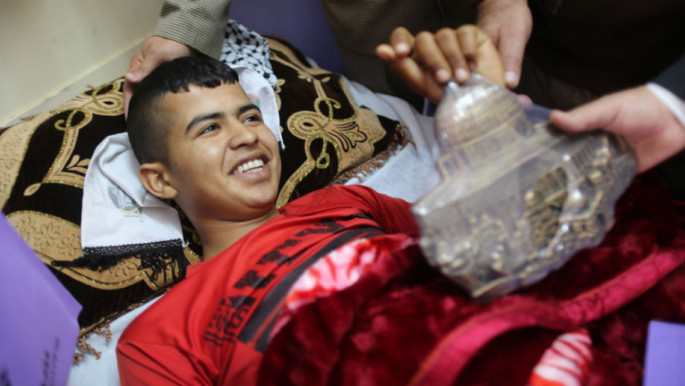
Palestinians are not just united because of our struggle, but because of who we are
United, they partook in dabke, ate Palestinian food being offered by their peers all while demonstrating in the Great Return March.
The Israeli army however reacted to the peaceful protest with violence, shooting at protesters and killing 17 people while leaving thousands more injured.
They later admitted to knowing that they were killing civilians in an "accurate and measured" operation in a tweet that was later deleted.
— B'Tselem בצלם بتسيلم (@btselem) March 31, 2018
|
Out of Gaza’s 1.9 million population, 1.3 million of them are relatives of Palestinians from the pre-1948 borders who had to flee their homelands during the Nakba, or catastrophe which saw the expulsion of more than 700,000 Palestinians to create Israel.
Despite still technically being on Palestinian soil, protesters marched because they yearned for their village. By the millimetre, home remains home – something that Palestinians have shown to never forget.
The march coincided with Palestine’s Land Day, which is a day to mourn the displacement that came as a result of the Nakba and to urge all Palestinians’ right to return.
With such a large proportion of Gaza’s population being from the pre-1948 borders – known as Muhajireen – the call to be able to leave the besieged enclave to return to their ancestral home was louder than ever this year. And even Palestinians whose families were not directly dispossessed by Israel during the Nakba relate to Land Day.
 |
The wars my family experienced, forcing them to survive instead of preserve leaves me often forgetting about my connection to Jenin |  |
Jenin is a province many Palestinian refugees fled to and is officially recognised as Palestinian territory. My maternal family were forced to flee to Syria after my great grandfather was killed by Zionist militias during the Nakba, leaving my grandfather to grow up without a father.
My mother’s side of the family were forced to survive between wars across the region instead of having the luxury of resettling and rekindling with their Palestinian identity.
I often forget about my connection to Jenin due to the little access I have to my mother’s relatives. It leaves me with a gap in one piece that forms my identity, despite being hyper-aware of my Jerusalemite heritage from my father.
After the Nakba, exile and displacement continued and remains until today. The devastation of three Israeli assaults on Gaza since 2008 killed thousands of Palestinians and displaced thousands more.
Settlements in the West Bank continue to render Palestinians without a home on a daily basis, while apartheid in Israel forces Palestinians who survived the Nakba and made to take up the identity as Israeli Arabs, to be stripped from their ability to live as full citizens in their ancestral towns and cities.
 |
Geography alters the experience of being Palestinian so much, that often, it seems like Palestinians are in solidarity with each other |  |
Land Day resonates with diaspora Palestinians, even those who are living in relative luxury. While they may not live under apartheid, siege, or occupation, a part of their identity remains near to them as there are now multiple generations in the diaspora who have not yet visited their homeland.
Yet, their accent when speaking Arabic remains the same, their connection with Palestinian food remains the same and they keep the cultural banter alive, whilst trying to break taboos.
Geography alters the experience of being Palestinian so much, that often, it seems like Palestinians are in solidarity with those who are living a different experience to them.
When US President Donald Trump declared Jerusalem as the capital of Israel, many portrayed the protests in Gaza as a form of solidarity with those protesting in Jerusalem – when in reality – they remain affected, albeit in a different way.
 |
|
| A Great Return March victim treated in a Gaza hospital being given a Jerusalem gift with a Palestinian kuffeyeh underneath him [Getty] |
A day after last week’s Gaza massacre, the West Bank and East Jerusalem partook in a general strike. Some defined the strike as an act of solidarity with Gaza. Whether in the West Bank or the Gaza Strip, Palestinians remain Palestinian and despite not being directly affected by the massacre, they remain victim to the same source of brutality.
 |
The message Israel was conveying was clear – the home you refer to is no longer your home |  |
The message Israel was conveying was clear – the home you refer to is no longer your home. To Israel, the symbol behind Land Day, which ultimately boils down to home, is a threat.
Whether it is through returning to a village, not being able to live in your house because a settler snatched it away or having gaps of knowledge in your heritage because your parents and grandparents were forced to survive rather than preserve, the various attacks on Palestinians revolve around the concept of home, and the deprivation of Palestinians from such.
To be in solidarity, one assumes it must be through a shared struggle, identity or cause. Palestinians do share a struggle through different experiences, but they do not identify with each other because of that shared struggle, they identify with each other because of who they are.
What are your thoughts? Join the conversation by tweeting us @The_NewArab





 Follow the Middle East's top stories in English at The New Arab on Google News
Follow the Middle East's top stories in English at The New Arab on Google News


